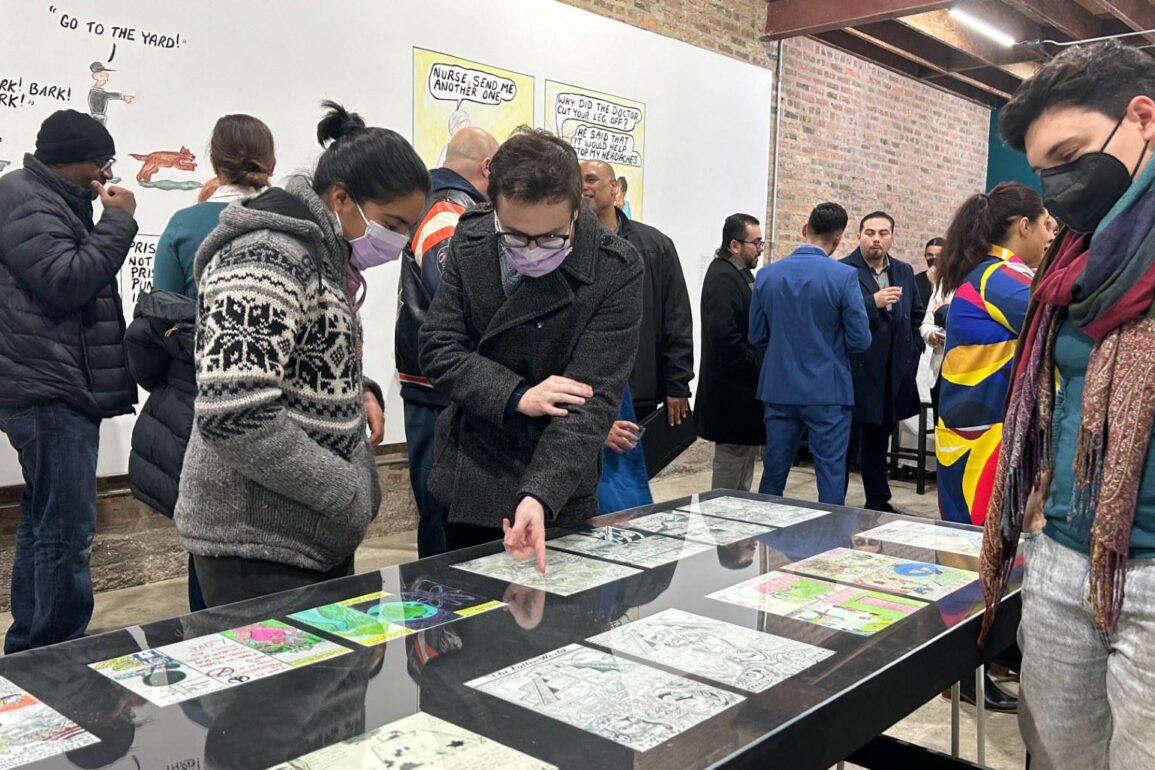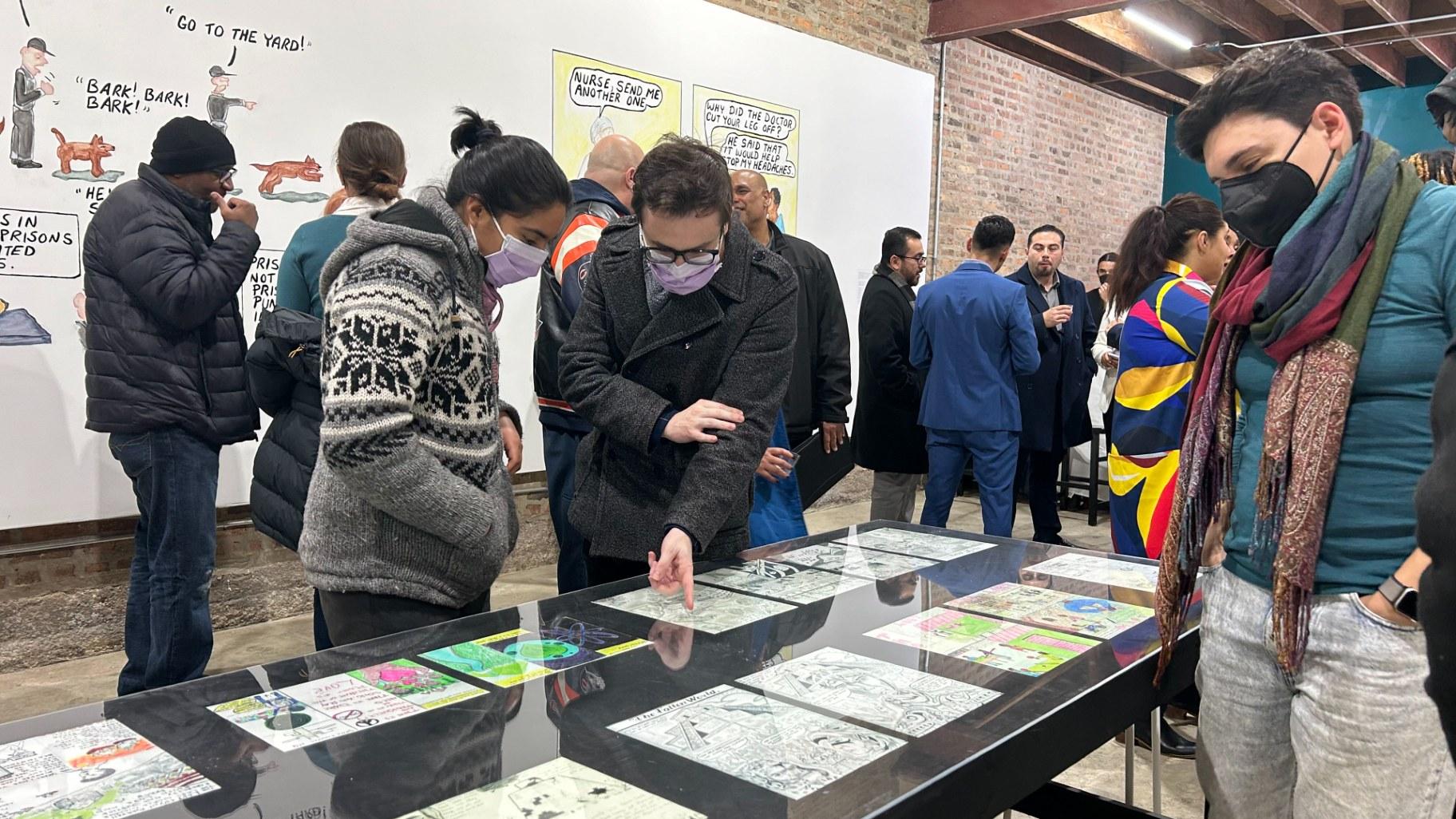 Attendees gather around the drawings of five Prison+Neighborhood Arts/Education Project participants. The organization had a grand opening of its gallery and community space, Walls Turned Sideways, 2717 W. Madison St., on Jan. 27, 2024. (Blair Paddock / WTTW News)
Attendees gather around the drawings of five Prison+Neighborhood Arts/Education Project participants. The organization had a grand opening of its gallery and community space, Walls Turned Sideways, 2717 W. Madison St., on Jan. 27, 2024. (Blair Paddock / WTTW News)
Robert Curry is a prolific artist.
Thanks to our sponsors:
But it’s a rare occasion for his aunts to see his work up close.
D’Andrea Mosely and Robin Adams peered down at the two pages of comics drawn by Curry: brightly colored panels depicting “The Lost Place” as he calls it. A community hub where, he writes, children were sent when tensions with law enforcement were high.
Children in the community play pool, ping pong and basketball as “a safe haven.”
These moments growing up in a three-story walk-up near 45th Street and Champlain Avenue are a cherished memory for Curry that contrasts to his nearly 20 years incarcerated at Stateville Correctional Center.
“It’s heartwarming, but it’s also heartbreaking,” said Mosely. “Now he considers it somewhere that is lost to him and others growing up in the neighborhood, just to the community at large that we don’t have these kinds of safe havens in the Black and Brown communities anymore.”
Curry is one of the six justice-impacted artists displaying their work at Walls Turned Sideways, 2717 W. Madison St. The gallery and community hub held its grand opening to a packed crowd on Saturday.
The initiative, born out of the Prison + Neighborhood Arts/Education Project (PNAP), had been about three years in the making. And for Pablo Mendoza, who spearheaded the project, it’s essential to use art as a bridge between people in and out of prison.
“We use art as connective tissue,” Mendoza said.
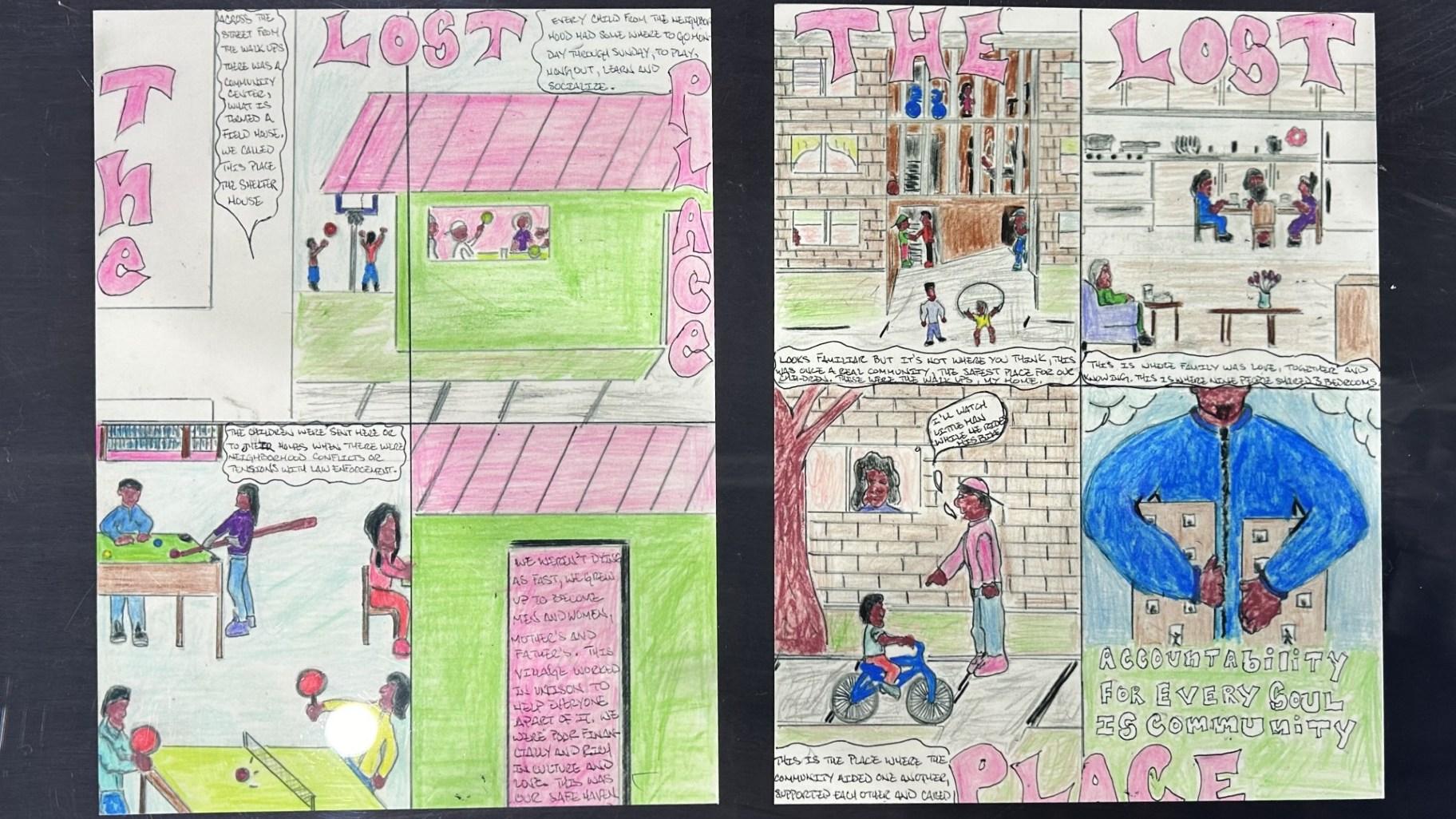 Robert Curry was among the six justice-impacted artists showcasing work at the Walls Turned Sideways opening on Jan. 27, 2024. His work depicts a community center near where he grew up. (Blair Paddock / WTTW News)
Robert Curry was among the six justice-impacted artists showcasing work at the Walls Turned Sideways opening on Jan. 27, 2024. His work depicts a community center near where he grew up. (Blair Paddock / WTTW News)
The first exhibit, titled “It Ain’t That Funny,” largely showcased the comic book work of artist Arkee Chaney, who spent 31 years behind bars.
Chaney was sentenced to natural life in the late 1980s under the “three strikes law,” which allowed prosecutors to seek mandatory life sentences after he and another man robbed a cab driver.
In June 2020, Chaney’s sentence was commuted by Gov. J.B. Pritzker to time served.
Chaney’s work is joined by artists who are PNAP participants at Stateville: Curry, Carlos Ayala, Antwan Tyler, Devon Terrell and Juan Luna.
The gallery fits right in line with work PNAP has been doing for over a decade: connecting teaching artists and scholars to incarcerated students through classes, workshops and lectures.
“We’re making sure that the art from the inside makes it out,” said Arianna Salgado, PNAP’s executive director.
The gallery name Walls Turned Sideways is an homage to a quote from activist Angela Davis: “Walls turned sideways are bridges.”
As Mendoza interprets it, the space’s goal is to build a bridge from inside prisons to outside to “rescue community members that were plucked out of neighborhoods.”
“They are our leaders, they are brothers and sisters, they are mothers and fathers,” Mendoza said. “They are not people that we throw away.”
Part of building that bridge is through community wellness. Mendoza said the project is looking at hosting events like art therapy.
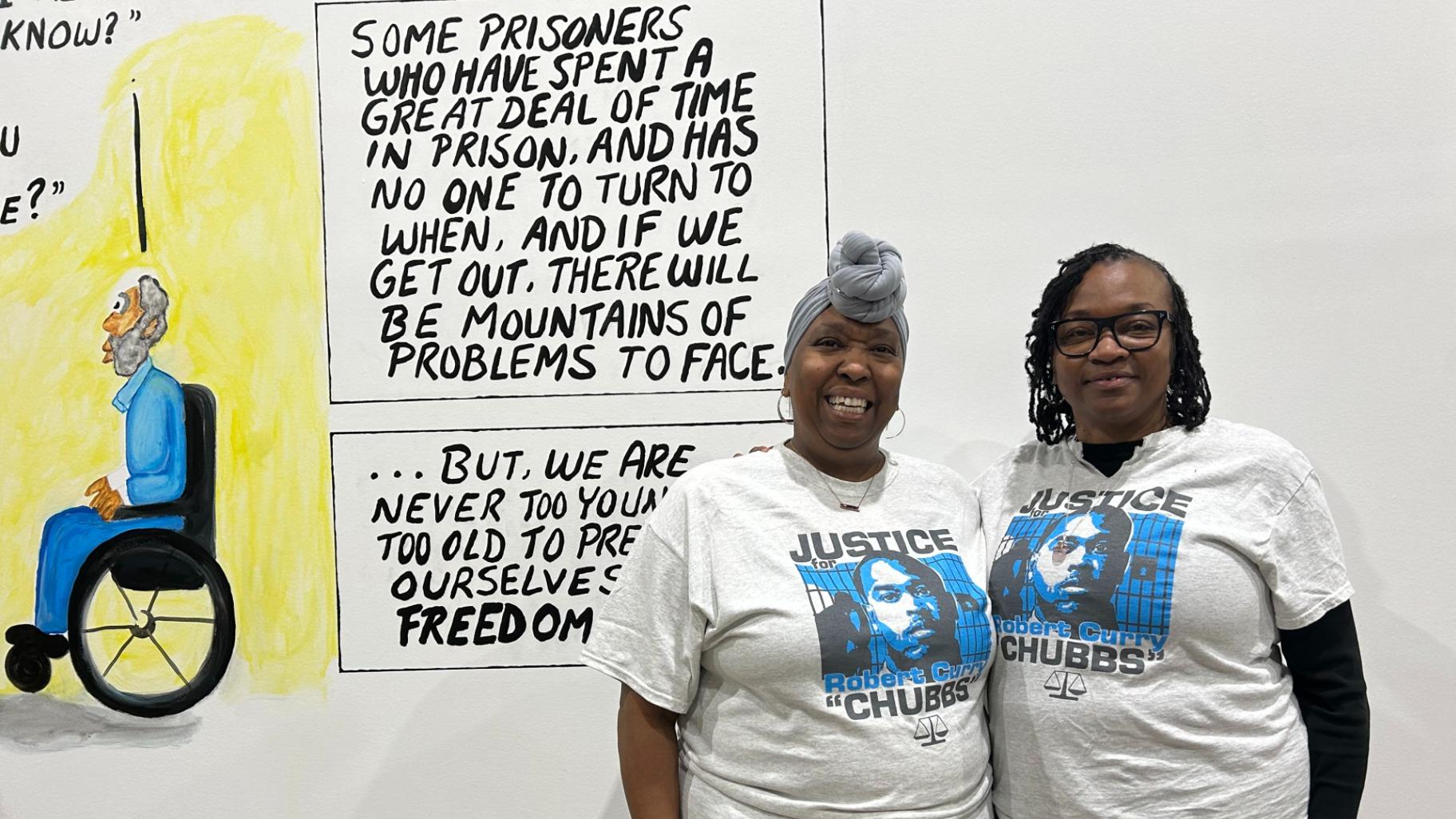 D’Andrea “Dee” Mosely (left) and Robin Adams (right), both aunts of artist Robert Curry, wear “Justice for Robert Curry” T-shirts at Walls Turned Sideways on Jan. 27, 2024. Family and loved ones say Curry has been incarcerated for nearly 20 years for a wrongful conviction. (Blair Paddock / WTTW News)
D’Andrea “Dee” Mosely (left) and Robin Adams (right), both aunts of artist Robert Curry, wear “Justice for Robert Curry” T-shirts at Walls Turned Sideways on Jan. 27, 2024. Family and loved ones say Curry has been incarcerated for nearly 20 years for a wrongful conviction. (Blair Paddock / WTTW News)
It’s a goal that Raylan Gilford is eager to help with. Based on his and others’ experiences of the trauma of incarceration, he released his book “Progressive Traumatic Prison Stress Disorder” in the fall.
On Feb. 22, he’ll be leading an event at the space for both returning citizens and their loved ones to understand the “unceasing harm that (incarcerated people) endure.”
“There’s not many places set up to help us when we release,” Gilford said. “We need a safe space to let formerly incarcerated citizens sit down and talk about our experiences using trauma-informed care.”
And on the inside, these educational resources that PNAP provides are vital, as Curry’s fiancee Barbara Easley pointed to his pursuit toward justice.
His aunts and other loved ones have been in the complications of a legal battle, as they say he was wrongfully convicted. He was found guilty of both murder and attempted murder and sentenced to 50 and 15 years for the respective offenses.
One of the many reasons they point to a wrongful conviction is audio recordings of another man confessing to the crime, according to a 2015 appellate ruling. The court dismissed this petition in part because the recording was made without that person’s consent.
Now, Curry has been working alongside his loved ones on the outside for freedom. At first, it was the Justice for Robert Curry Foundation, but has now become the Freedom Movement because “he said it was not just about me,” Adams said.
Just like the final panel of Curry’s comic says: “Accountability for every soul is community.”
“It Ain’t That Funny” is on display until May 4. Gallery hours are noon-5 p.m. Thurs.-Sat. or by appointment.
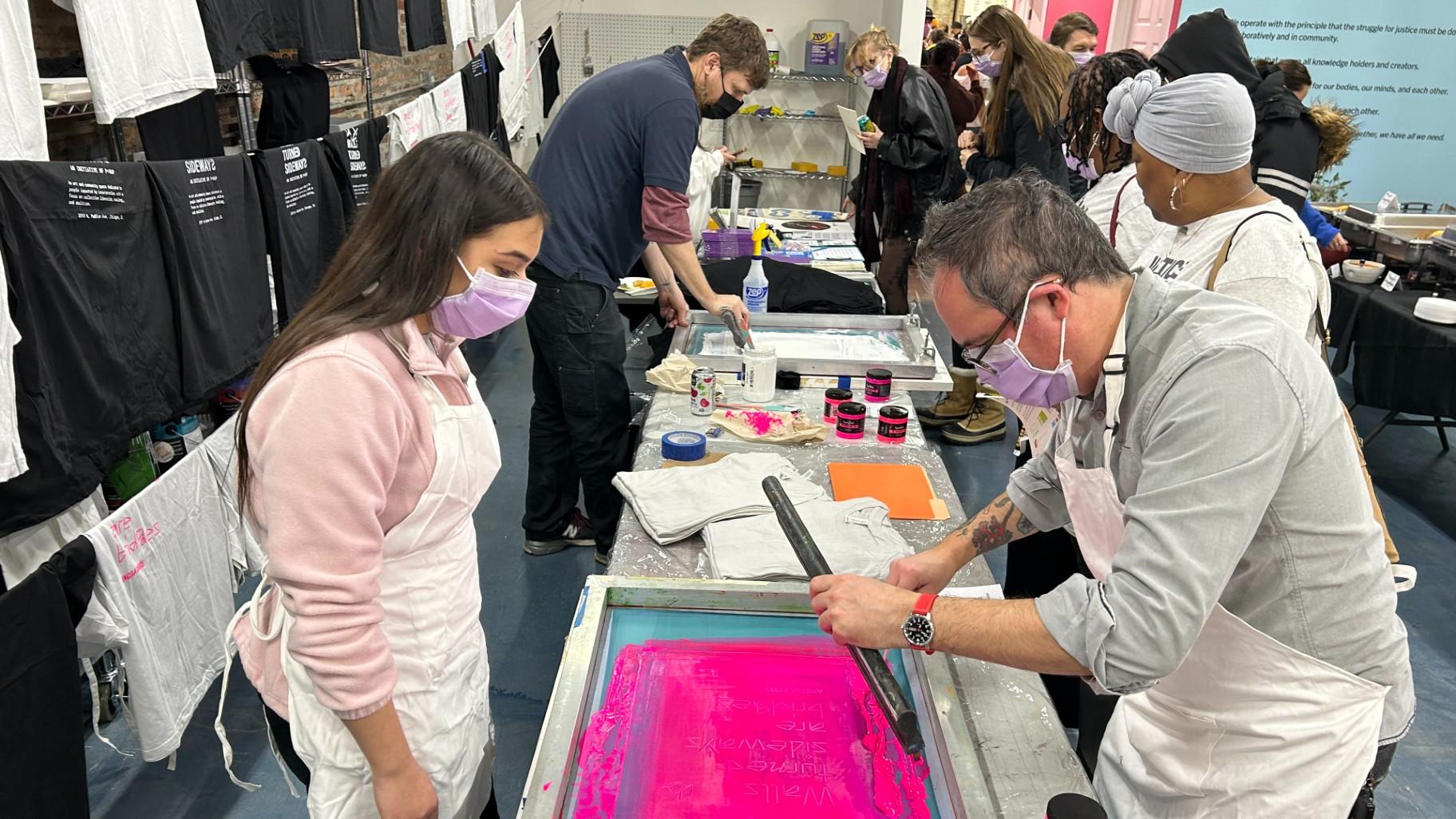 Attendees screenprint shirts saying, “Walls turned sideways are bridges,” a quote from the activist Angela Davis, at Walls Turned Sideways on Jan. 27, 2024. (Blair Paddock / WTTW News)
Attendees screenprint shirts saying, “Walls turned sideways are bridges,” a quote from the activist Angela Davis, at Walls Turned Sideways on Jan. 27, 2024. (Blair Paddock / WTTW News)
Thanks to our sponsors:
Thanks to our sponsors:
This post was originally published on this site be sure to check out more of their content.



